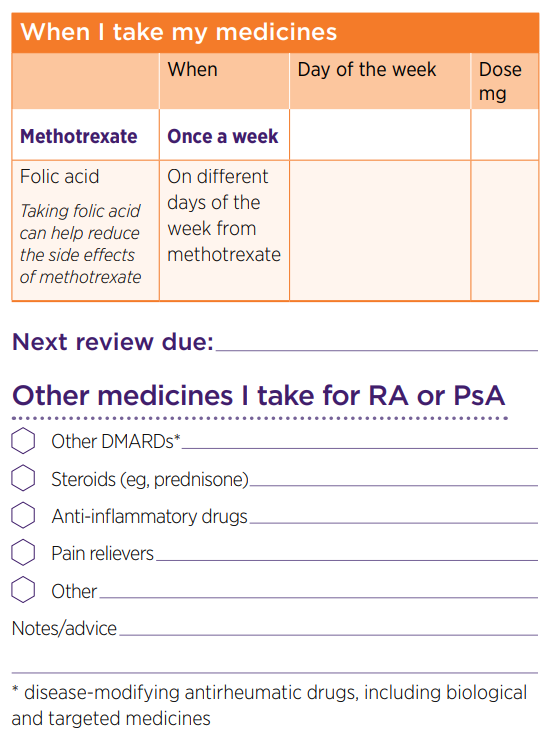Inflammatory arthritis action plan: Low-dose methotrexate for rheumatoid arthritis and psoriatic arthritis
Rheumatoid arthritis (RA) and psoriatic arthritis (PsA) are long-term conditions where the body’s immune system mistakenly attacks healthy tissues such as the joints and skin. This causes inflammation, leading to symptoms such as joint pain and swelling. Use this action plan to discuss methotrexate with your rheumatologist and plan the best way to take your medicine.
Methotrexate acts to control the disease
Methotrexate doesn’t just block pain and other symptoms of RA and PsA. It interrupts the activity of the immune system, slowing the disease and reducing inflammation.
Early treatment with methotrexate (within 3 months of symptoms appearing) can:
- stop the disease from getting worse
- reduce the chance of long-term joint damage caused by uncontrolled inflammation
- improve symptoms such as joint pain, swelling and stiffness.
Methotrexate:
- is called a disease-modifying antirheumatic drug. You might hear it called a DMARD for short
- is usually taken as a tablet, but can also be an injection
- takes time to work – you might not feel better for 6–12 weeks
- is also used for the skin condition psoriasis, which is associated with PsA.
Focus on facts
Myths about methotrexate can be barriers to treatment. Knowing the facts helps people stick to their treatment and improves results.
| Fact | Fact | Fact | Fact |
| Methotrexate is safe and effective at low doses for RA and PsA – it's not considered chemotherapy at these doses. | Methotrexate can be safely taken with non-steroidal anti-inflammatory drugs (NSAIDS). | Methotrexate injections can be safely self-administered. | People taking methotrexate for RA or PsA can safely make physical contact with pregnant women. |
| Myth | Myth | Myth | Myth |
| Low-dose methotrexate is chemotherapy. | You will notice the benefits of methotrexate straight away. | Giving yourself methotrexate injections is unsafe. | People taking methotrexate cannot be near pregnant women. |
Ongoing care
Blood tests
Regular blood tests are used to check treatment is working and monitor for side effects, measuring kidney and liver function, and doing full blood count. Over time, these tests are needed less often.
Clinical review
Joint pain and physical function are reviewed regularly. How often depends on how active the disease is.
Vaccinations
Keep your pneumococcal and influenza vaccinations up to date.
Other conditions
You will be monitored for heart disease, osteoporosis and skin cancer, as the risk of these increases with RA and PsA. Annual skin checks are recommended.
Reproductive health
You should seek specialist advice if you plan to have children. Women should use birth control while taking methotrexate, stop methotrexate 3 months before planning a pregnancy, and avoid breastfeeding while on methotrexate.
Taking low-dose methotrexate
Share this action plan with your healthcare team to help you achieve your treatment goals.

When to contact my doctor
Urgently
- If I develop any new infections. Signs of infection include a fever, redness or painful skin or wounds.
- If I develop breathing difficulties and/or a dry cough.
As soon as possible
- If I experience a flare-up. In the meantime I will start my flares action plan
https://www.nps.org.au/bdmards/rheumatology/resources.
Regularly
- To make appointments for routine tests to monitor my disease and medicines.
- To check that I am up to date with my vaccines and seek advice for travel vaccines.
- If I am taking or plan to take any other medicines, including over-the-counter, herbal and naturopathic medicines.
Side effects of methotrexate
Like all medicines, methotrexate may cause side effects.
Most common side effects include:
- nausea, vomiting, diarrhoea
- mouth ulcers
- increased skin sensitivity to the sun
- tiredness, headache and feeling foggy.
Talk to your doctor if you are concerned. Side effects may be reduced by taking methotrexate with food or in the evening.
Further information
Arthritis Australia (arthritisaustralia.com.au) (myRA.org.au)
Australian Rheumatology Association’s patient information
- Methotrexate
- Self injecting low-dose methotrexate
- Video on how to inject methotrexate safely
NPS MedicineWise (nps.org.au/managing-ra)
Download the MedicineWise app to keep track of your medicines and access health information such as blood test results. (medicinewiseapp.com.au)
NPS Medicines Line: 1300 633 424
Download the original pdf of this article
Back to Inflammatory arthritis resources hub
